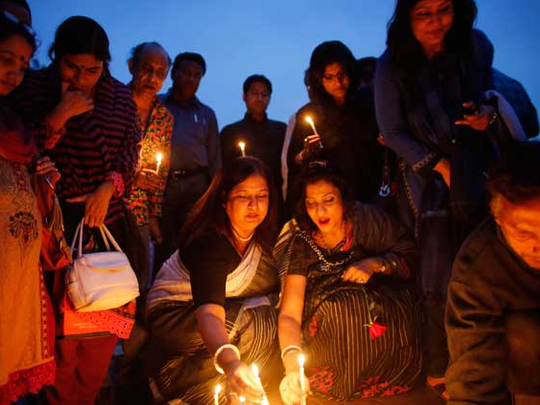
Johannesburg: “We will sleep after the funeral,” shouts a young woman as her group starts another full-throated freedom song and begins dancing its way down Vilikazi Street, swelling with more willing bystanders as it goes along.
As the chanting grows louder and the stamping of the toyi-toyi — a dance popularised by freedom fighters — picks up, a pantheon of leaders from the South African liberation movement come alive again, in song. “Tambo, Mandela, Sisulu – we are your soldiers, tell us what we must do”.
This time however, there is no anger in the thrusting fists and rousing choruses, only more celebration of the life of Nelson Mandela.
“We always sing,” says Moagi Morake, “happy or sad. But we are not mourning, we are celebrating Madiba.”
As proof of how much the sentiment behind the songs has changed, a police car is allowed to push its way through the crowd, on the Soweto street where a former home of Mandela has become a museum and where crowds have been gathering since the announcement of his passing.
Twenty years ago, as Mandela and the African National Congress (ANC) were taking power, the police would not have been as brave or the crowd as accommodating.
This patience by South Africans, many of whom maintain a healthy disdain for authority, will come as some good news for the officials arranging today’s national memorial service for Mandela. The public event is to be attended by an ever increasing number of heads of state — the government is reportedly preparing for between 50 and 70. Top of the list is US president Barack Obama and his predecessors, George Bush, Bill Clinton and Jimmy Carter.
South African officials have not hazarded a guess as to how many people will be attending, but arrangements have been made to accommodate significant overflow from the FNB Stadium, that can accommodate about 95 000, in other venues across Johannesburg.
The scale of the event and short notice has made some arrangements chaotic, but government officials have remained upbeat about the event being a success. They have warned that security arrangements, based on those successfully implemented during the 2010 soccer world cup, will be enforced. The thunderstorms, that are usual for this time of year, are predicted to continue today.
Back on Vilikazi Street, even though there are only ANC T-shirts to be seen in the crowd after supporters claimed the event, loud political discussions are underway. For some, coming to say goodbye to Mandela is also a way of saying goodbye to the ANC.
“For me voting was about voting for the ANC,” says one estranged supporter. But, in next year’s election he intends to vote for the Economic Freedom Fighters, a party recently formed by disaffected ANC leaders.
“Not because of their policies, but because the ANC has become arrogant and does not listen to the people,” he explains. For him, the ANC has “gone another way” from Mandela’s humility and commitment to improving the lives of poor South Africans.
Political analyst William Gumede believes that Mandela’s death is likely to exacerbate this trend away from the ANC — even if, for now, the country has united behind the memory of an icon who remained loyal to the organisation until the end.
“ANC supporters are trying to conflate it with Mandela. But I believe a tipping point has been reached [after months in which the ruling ANC and its allies has been mired in government corruption scandals and political infighting]. In some ways, Mandela’s passing will make it easier for those members who were loyal to him to break with the ANC,” he told Gulf News.
Gumede has recently edited a book of Mandela’s early papers.
Yesterday there was a special sitting of the South African Parliament, to give its members a chance to pay tribute to South Africa’s first democratically elected president. Buildings were draped in banners honouring him, his speeches were played on screens set up in the precinct and local and international tributes received.
After today’s service, Mandela’s body will lie in state in the Union Building in Pretoria for the next three days. He will then be buried alongside his children in Qunu, in the Eastern Cape province on December 15. Traditional rites are expected to be observed, as Mandela was also a local traditional leader.












